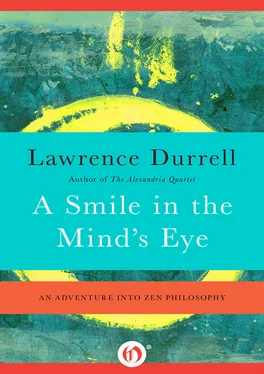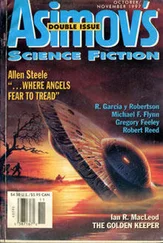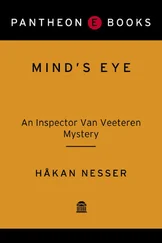After this we started cooking again and my companion said, ‘After we have eaten I shall give you a very special pleasure. I had the luck to pick up a piece of Sung ceramic in an antiquary’s shop in London for a few pence — he had not recognized it.’ Duly, when we had finished our meal, he hunted through his little air-satchels, taking, in passing, a fanatical sip of milk from his bottle, and then produced a small dark-brown vase; there was nothing on it in the way of engraving or decoration, and indeed, there seemed to be little enough to it — one has seen lathe-turned objects of precision which have a certain snug efficiency of shape without being aesthetically haunting. I said so, but he only smiled. ‘But you are not looking. Just look at it, like a shape, like a shadow or a cloud.’ He picked it up on three fingers and with a turn of the wrist presented it towards the window with its sunlight. ‘How do you know it is a Sung piece?’ He smiled again. ‘The proportions — there is no other distinguishing mark. That is why the antiquary missed it. He is like a blind man who has to proceed from the familiar touch of things. Here, if one only had to touch one could not tell what it was. Try looking into it and feel the proportions, feel the way it was potted like a bird’s egg.’ After a while I began to see in a dim way what he saw; it was rather like a theorem in geometry. Then I realized that what he was admiring was the way the little object filled itself with empty space — he was not admiring the skilful manipulation of matter, the beauty of function only. Thus one might, from our point of view, find the little memento without much significance while from his it was an exquisite trap set to decorate the circumambient space without and around it. The Chinese aesthetic — well, talk about negative capability! The counterweight to matter was space, the counterpoise to music, silence. The aesthetic lay in the appreciation of the magic fulcrum. Moreover, it weighed aesthetically while working practically! Yes, I had begun to see in a vague sort of way what constituted a delicious aesthetic experience for Jolan Chang. China had moved that much closer to me.
He was specially struck by the fact that in the gloomy hall of my tumbledown old house I had stuck up four beautiful Chinese panels of wood which I found being auctioned off at the public auctions in Nimes. They had cost almqst nothing. Each one was the height of a man and the wood appeared to be some very stout and beautiful slice of teak. He recognized unhesitatingly that they came from Peking, though in fact the French doctor who had sold them off in Nimes had brought them back from Saigon. They were coloured panels which, so I was told, hang outside the pharmacies in the Far East — advertising, in fact, designed to attract custom. Two were red and two black — the yang and the yin, the two principles of nature. The red had poems engraved on them, and the black medical captions. But just what they said was anyone’s guess, and I had been waiting for someone Chinese to come and translate them for me. I had waited about six years, but when one knows that one is going to live for ever one can afford to wait on time with happy resignation. Now Chang had given these the most meticulous and delighted examination, and proposed to translate them for me in good round English. They did, he said, indeed hang outside Oriental pharmacies. The red had some health-giving poetry upon them while the black carried a sort of admonitory caption citing the name of some great medical master of the past. It was as if one saw on such a panel in Europe the legend MEDICAL PRINCIPLES AS OUTLINED BY PARACELSUS. Nor had I been wrong about the two colours standing for the two cosmic principles. It was the old rocking-chair of the Tao. I had by now realized that all the Chinese, without exception, were Taoist in their philosophical and aesthetic aspect and Confucian in their dogmatic and theological aspect. The great penetration and balance of Chinese intellectual and aesthetic life was centred upon this fruitful marriage. In just such a way, too, the French have managed to arrive at a fruitful and harmonious marriage of Rabelais and Pascal, of Montaigne and Descartes, in their basic natures. My panels themselves were handsome in the extreme and I was glad that at last — even in an inadequate foreign translation — they would be able henceforward to speak to me.
LEGEND ON RED PANEL
Four wells full of clouds and smoke spreading the grasses.
LEGEND ON RED PANEL
A full courtyard with the wind and the dew engendering flowers.
LEGEND ON BLACK PANEL
The Art of Medicine will profit by taking into account the skill of Wah To in opening stomachs and cleaning them.
LEGEND ON BLACK PANEL
The Art of Surgery profits by recalling the techniques of Pian Cha in opening the chest and in transplanting hearts.
Chang did not have the books to hand to fill in the biographical details about the two doctors, but he promised to repair the omission the moment he got to Cambridge where he was going to spend ten days consulting about the avant-propos he had been offered for his book and various other matters. Apparently there was a very choice if small Chinese reference library at Cambridge — I did not know this. Yet true to his word he rang me up about a week after his departure and said that he had looked up the two doctors. He was very excited by the panel devoted to PIAN CHA because of its unique reference to heart transplants. He had never seen such a reference before on any such comparable panel. PIAN CHA had been a famous surgeon indeed and his downfall had been brought about by palace intrigue, presumably by jealous competitors. This was the most interesting of the panels from his point of view. But I was delighted that he had found the name of WAH TO also. He had been a famous Taoist physician who practised in the second or third century. So at last my health-giving fetishes of panels were intelligible; it was clear also that the scarlet poetry panels had been influenced by Ezra Pound a bit!
So the day wore on into night and I switched on the lights in the verandah, with its weird ‘retro’ coloured glass; and whenever we practised a Vampire Chortle or an Outer Mongolian eldritch shriek the owls flew snickering down from the tower, while the little Scops (the Athenian owl) enchanted by the light through the coloured glass gave out its plaintive whirp. We walked up and down like bears arguing and discussing. ‘Virginity is not the issue; the thing is that from the Chinese point of view natural modesty which is delightful in woman or man should never be allowed to degenerate into prudishness or prurience, for that is an illness in Taoist terms. Our pretty erotic pillow-books are the answer for it, and young lovers use them in that sense, to rid themselves of any morbid surplus of guilt or fear.’ Of course, I realized the difference now — in a sense the Taoist never escaped from the sense of belonging to the whole human and cosmic process, neither when he was breathing nor when he was making love. It was the negative capability again; he was free of the ergo sum complex. Nevertheless there was still much more that one wanted to know after reading his texts — in my case very much more. It would have been most interesting to have some discussion of the kind of typology that Chinese astrology would offer to the couple, a science which, after all, stood once for something as comprehensive as our so-called psychology; indeed, when you think of the poverty of our modern psychological typology which boils down to about three human types physical or mental, in all … Even if astrology is highly arguable as an exact science, it does try to circumscribe the vast variety of the human dispositions and the contingencies surrounding their appearance on earth at one time and place. But of course this was outside my friend’s brief; and he didn’t want to give the impression that he was in any way interfering with the plain and fair scholarship of his book by staking claims — beyond the fact that he had tried the precepts and found that they made supersense.
Читать дальше











